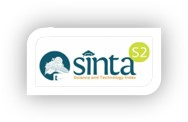The Effectiveness of Google Classroom Learning Applications on Student Learning Outcomes
Abstract
This research aimed to determine the effectiveness of Google Classroom learning on the learning outcomes of students of STKIP Pembangunan Indonesia at the Biology Study Program. The benefit of this research is that the results are expected to contribute to the teaching and learning process that lecturers will carry out, especially the application of the Google Classroom in improving students’ learning outcomes. The researchers employed the quantitative approach with a pre-experimental design of one group pretest-posttest, which provided a pretest before the treatment. After the treatment, the researchers administered a posttest on the Vertebrate Zoology course. The data collection technique applied in this research was a description test administered during the pretest and posttest. This research found that the students’ learning outcomes in the pretest were 36% in the completeness level. There was an increase in the posttest with a 72% completeness level. The results of hypothesis testing using an independent sample t-test obtained value of 3,149, which was higher than tobserved of 1.67. The results showed that students’ learning outcomes after using Google Classroom were significantly better than before the application of Google Classroom. This research proved that Google Classroom was an online learning method that can improve the quality of education, especially students’ learning outcomes, and could overcome the constricted learning process with the availability of actual classrooms.
Keywords
Full Text:
PDFReferences
Abid Azhar, K., & Iqbal, N. (2018). Effectiveness of Google Classroom: Teachers’ Perceptions. Prizren Social Science Journal, 2(2), 52–66.
Deviyanti, E. & Y. (2020). Pengembangan Media E-Learning Berbasis Googleclassroom Untuk Meningkatkan Hasil Belajarsiswa Pada Mata Pelajaran Ekonomi Kelas XI Di SMA Unggulsakti Jambi. Al Intaj: Jurnal Ekonomi Dan Perbankan Syariah, 6(2), 303–316. https://doi.org/10.38035/JMPIS
Hamka, D., & Vilmala, B. K. (2019). Pengembangan Perangkat Pembelajaran Blended Learning Melalui Aplikasi Google Classroom Untuk Peningkatan Kemandirian Belajar Mahasiswa. Journalof Education Informatic Technology and Science (JeITS), 1(2), 145–154.
Ibrahim, D. S., & Suardiman, S. P. (2014). Pengaruh Penggunaan E-Learning Terhadap Motivasi Dan Prestasi Belajar Matematika Siswa Sd Negeri Tahunan Yogyakarta. Jurnal Prima Edukasia, 2(1), 66–79. https://doi.org/10.21831/jpe.v2i1.2645
Khoiroh Ni’matul, Munoto, dan L. A. (2017). Pengaruh Model Pembelajaran Blended Learningdan Motivasi Belajar Terhadap Hasil Belajar Siswa. Ilmu Pendidikan, 10(2), 97–110. https://doi.org/10.21831/jpipfip.v10i2.13986
Latif, S. (2017). Learning Engagement in Virtual Environment. International Journal of Computer Applications, 148(11), 7–13. https://doi.org/10.5120/ijca2016911289
Muslik, A. (2019). Google Classroom sebagai Alternatif Digitalisasi Pembelajaran Matematika di Era Revolusi Industri 4.0. Andragogi: Jurnal Diklat Teknis Pendidikan Dan Keagamaan, 7(2), 246–255. https://doi.org/10.36052/andragogi.v7i2.98
Nirfayanti & Setyawan, D. (2018). Efektifitas Pembelajaran Program Linear Berbantuan Geogebra Terhadap Hasil Belajar Mahasiswa. Jurnal Proximal, 1(2), 22–30.
Nirfayanti, N., & Nurbaeti, N. (2019). Pengaruh Media Pembelajaran Google Classroom Dalam Pembelajaran Analisis Real Terhadap Motivasi Belajar Mahasiswa. Proximal Jurnal Penelitian Matematika Dan Pendidikan Matematika, 2(1), 50–59.
Rikizaputra & Sulastri, H. (2020). Pengaruh E-Learningdengan Google Classroomterhadap Hasil dan Motivasi Belajar Biologi Siswa. Jurnal Pendidikan, 11(1), 106–118. https://doi.org/10.35393/1730-006-002-014
Sabran, & Sabara, E. (2019). Keefektifan Google Classroom sebagai media pembelajaran. Prosiding Seminar Nasional Lembaga Penelitian Universitas Negeri Makasar, Edisi 2, 122–125.
Sadiman, A. (1984). Media Pendidikan. Raja Grafindo Persada.
Salamah, W. (2020). Deskripsi Penggunaan Aplikasi Google Classroom dalam Proses Pembelajaran. Jurnal Penelitian Dan Pengembangan Pendidikan, 4(3), 533–538.
Sudjana, N. (1987). Cara Belajar Siswa Aktif. PN Sinar Baru.
Sugiono. (2011). Quantitative, Qualitative, and R&D Research Methods. Alphabeta.
Sugiono. (2016). Educational Research Methods Quantitative and Qualitative Approaches. Alphabeta.
Suryani, A. (2010). Ict in Education: Its Benefits, Difficulties, and Organizational Development Issues. Jurnal Sosial Humaniora, 3(2), 109–127. https://doi.org/10.12962/j24433527.v3i2.643
Wahyuni, T., Komarudin, K., & Anggoro, B. S. (2019). Pemahaman Konsep Matematis Melalui Model WEE Dengan Strategi QSH Ditinjau Dari Self Regulation. AKSIOMA: Jurnal Program Studi Pendidikan Matematika, 8(1), 65–72.
Yasin, M., Huda, S., Komarudin, S., Septiana, R., & Palupi, E. K. (2019). Mathematical Critical Thinking Ability: The Effect of Scramble Learning Model assisted by Prezi in Islamic School. Volume 1467.
DOI: http://dx.doi.org/10.24042/biosfer.v12i2.9723
Refbacks
- There are currently no refbacks.
Copyright (c) 2022 Biosfer: Jurnal Tadris Biologi
License URL: https://creativecommons.org/licenses/by-sa/4.0

















